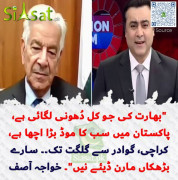Night_Hawk
Siasat.pk - Blogger
[h=1]Losing Ammi to Alzheimers bit by bit[/h] By Rabia Ahmed Published: May 11, 2014

Has my mother's Alzheimer taken her back to her original reality, the one without our father and the five of us? PHOTO: REUTERS
For my mother, who is leaving us bit by bit taking her memories along with her. But our memories of her will stay with us of a mother who loved us and cared for us always, like mothers everywhere.
The writer, Jarod Kintz, once said,
That theft is exactly what causes the agitation that immobilises my mother. My mother has Alzheimers and she knows that there is something she cannot remember. But she cannot figure out what that something is and it tears her apart.
She would tell me hurtfully, when she could, that her memory is gone. And she was right, her memory has parted ways and it makes you wonder how and where it could have disappeared to. The memories that my mother has lost were important to her, to us, but I guess well never know.
What are memories?
We tend to call memories weak or powerful so are memories a form of energy?
But if energy cannot be destroyed, if they simply change form, where do memories go when we lose them? Do they float around like midges in the air? Do my mothers memories scatter every time she tries to grab one then coalesce again as a cloud composed of sparkling names and incidents born years ago?
A cloud is that why today she seems to emerge only now and then like the sun from behind a cloud to make a random remark before returning once again into what I see as oblivion.
Is she lost amidst a swirling cloud of her past?
What were my mothers memories anyway?
I wish I had asked my mother about her memories while I had the chance. How many times have I heard this from so many people, and I say it now. I wish Id heard her stories, written them down even, remembered them, but they werent important to me when I was young and I didnt do any of those things.
Now all I remember are strange exotic names like birds of jewelled plumage that live in a foreign land, Melur, Visakapattam, Negapattam, Kodaikanal, Gudur. She mentioned them often and I dont even know why. Kodaikanal is a hill resort, this I know now, courtesy of the internet. I suppose they went there, my mother and her family. That was once her reality, before we, her children, became a part of it.
But she doesnt recognise us now, she doesnt recognise me. Not when I or any of us hug her, kiss her or put a spoonful of food into her mouth. There is nothing more disorienting than your own mother looking at you and not knowing who you are, not telling you to wear something different, not frowning at you forgetting to put something away in its place.
Has she gone back to her original reality, the one without our father and the five of us?
I think she has.
My mother was a great cook and very hospitable. Regardless of losing other memories, she still remembers her manners, until recently, when she falteringly asked us to give our guests something to eat. She also never reveals her overwhelming agitation in front of guests. A psychiatrist told us that social manners linger after everything else is gone. I have, in fact, till recently been upstaged by halwas because she remembered how to make them.
The word Madras is a magic word for her now as is her maiden name Sayeed. They wake her up and bring a light into her eyes for a very fleeting moment. For her, her distant past is her reality now. At least she has that.
What is reality, after all? Is my reality different to anothers? Is each persons reality different to anothers?
There is a metaphysical theory relating to this called solipsism which says that,
Does it also mean that if her children neglect a mother, the only real sufferers are the children and not the mother? Does a direct result of their actions exist only in their reality? That in her reality, she does not suffer? Does it mean, in short, that if we did not care for our mother, she would nevertheless happily exist in some hill resort in Madras?
What a dangerous belief, an awful one at that. David Foster Wallace said that,
Isnt it terribly odd that it is the existence of the Divine that should determine the existence of humanity among humans?
http://blogs.tribune.com.pk/story/20983/losing-ammi-to-alzheimers-bit-by-bit/

Has my mother's Alzheimer taken her back to her original reality, the one without our father and the five of us? PHOTO: REUTERS
For my mother, who is leaving us bit by bit taking her memories along with her. But our memories of her will stay with us of a mother who loved us and cared for us always, like mothers everywhere.
The writer, Jarod Kintz, once said,
Alzheimer not only steals from you, it steals the very thing you need to remember whats been stolen.
He indeed was right.
That theft is exactly what causes the agitation that immobilises my mother. My mother has Alzheimers and she knows that there is something she cannot remember. But she cannot figure out what that something is and it tears her apart.
She would tell me hurtfully, when she could, that her memory is gone. And she was right, her memory has parted ways and it makes you wonder how and where it could have disappeared to. The memories that my mother has lost were important to her, to us, but I guess well never know.
What are memories?
We tend to call memories weak or powerful so are memories a form of energy?
But if energy cannot be destroyed, if they simply change form, where do memories go when we lose them? Do they float around like midges in the air? Do my mothers memories scatter every time she tries to grab one then coalesce again as a cloud composed of sparkling names and incidents born years ago?
A cloud is that why today she seems to emerge only now and then like the sun from behind a cloud to make a random remark before returning once again into what I see as oblivion.
Is she lost amidst a swirling cloud of her past?
What were my mothers memories anyway?
I wish I had asked my mother about her memories while I had the chance. How many times have I heard this from so many people, and I say it now. I wish Id heard her stories, written them down even, remembered them, but they werent important to me when I was young and I didnt do any of those things.
Now all I remember are strange exotic names like birds of jewelled plumage that live in a foreign land, Melur, Visakapattam, Negapattam, Kodaikanal, Gudur. She mentioned them often and I dont even know why. Kodaikanal is a hill resort, this I know now, courtesy of the internet. I suppose they went there, my mother and her family. That was once her reality, before we, her children, became a part of it.
But she doesnt recognise us now, she doesnt recognise me. Not when I or any of us hug her, kiss her or put a spoonful of food into her mouth. There is nothing more disorienting than your own mother looking at you and not knowing who you are, not telling you to wear something different, not frowning at you forgetting to put something away in its place.
Has she gone back to her original reality, the one without our father and the five of us?
I think she has.
My mother was a great cook and very hospitable. Regardless of losing other memories, she still remembers her manners, until recently, when she falteringly asked us to give our guests something to eat. She also never reveals her overwhelming agitation in front of guests. A psychiatrist told us that social manners linger after everything else is gone. I have, in fact, till recently been upstaged by halwas because she remembered how to make them.
The word Madras is a magic word for her now as is her maiden name Sayeed. They wake her up and bring a light into her eyes for a very fleeting moment. For her, her distant past is her reality now. At least she has that.
What is reality, after all? Is my reality different to anothers? Is each persons reality different to anothers?
There is a metaphysical theory relating to this called solipsism which says that,
The self is the only existing reality and that all other reality, including the external world and other persons, are representations of that self, that they have no independent existence.
Does it therefore mean that we, my mothers children are no longer real, because we do not exist in her reality?
Does it also mean that if her children neglect a mother, the only real sufferers are the children and not the mother? Does a direct result of their actions exist only in their reality? That in her reality, she does not suffer? Does it mean, in short, that if we did not care for our mother, she would nevertheless happily exist in some hill resort in Madras?
What a dangerous belief, an awful one at that. David Foster Wallace said that,
When a solipsist dies, everything goes with him.
No, whatever everything is, it doesnt die because joy and suffering remain. Who cares whose reality they are in at the time that they exist? It is hard to watch a person suffer whichever reality it may be in, because if each man is answerable to a higher authority for his actions, that suffering would be each mans reality; his conscience, his record, his heartbeat, his entire world. That, in the final analysis appears the determining question then, our belief in accountability, in the presence or absence of God. That is the question that makes us humane.
Isnt it terribly odd that it is the existence of the Divine that should determine the existence of humanity among humans?
http://blogs.tribune.com.pk/story/20983/losing-ammi-to-alzheimers-bit-by-bit/
































